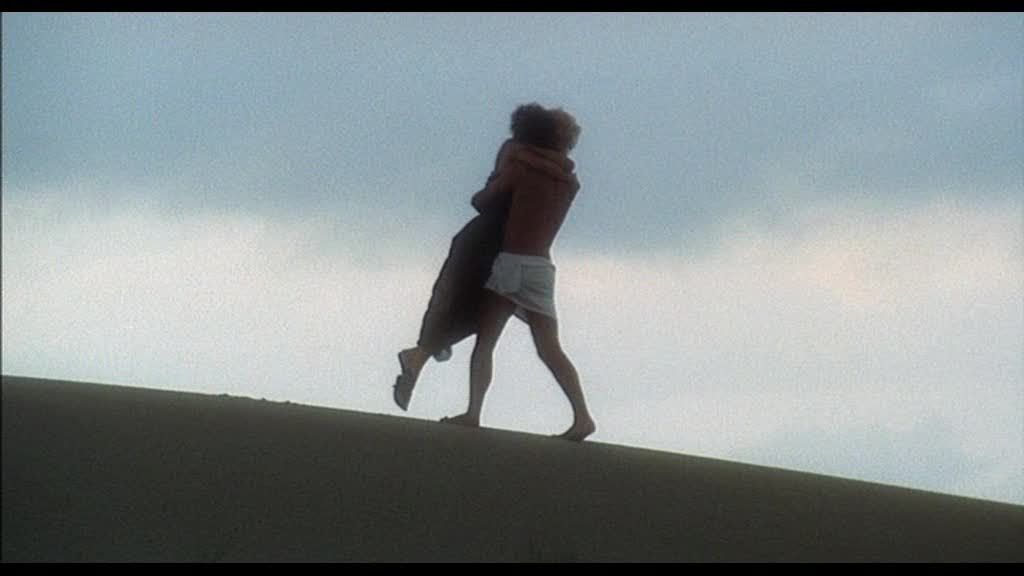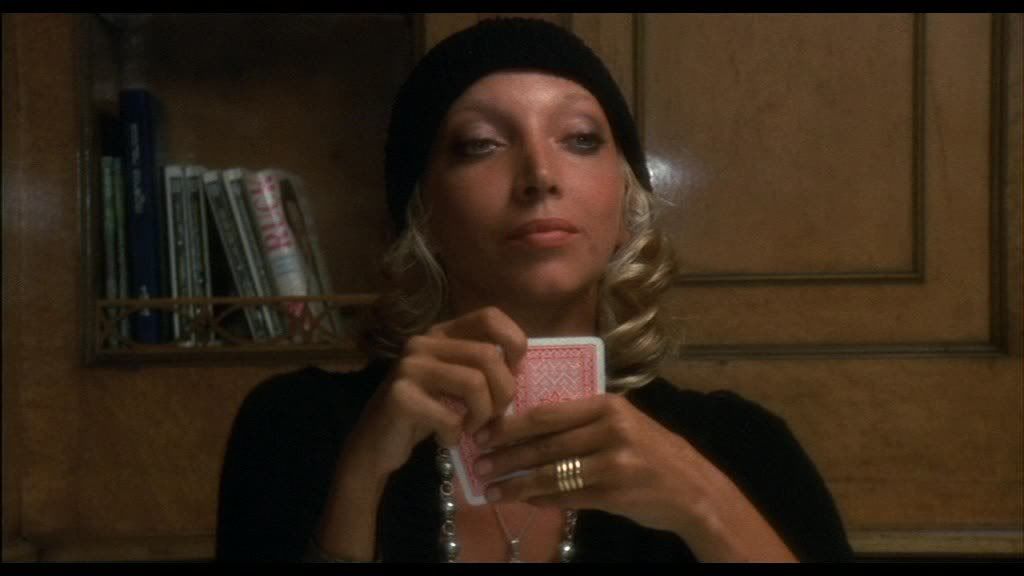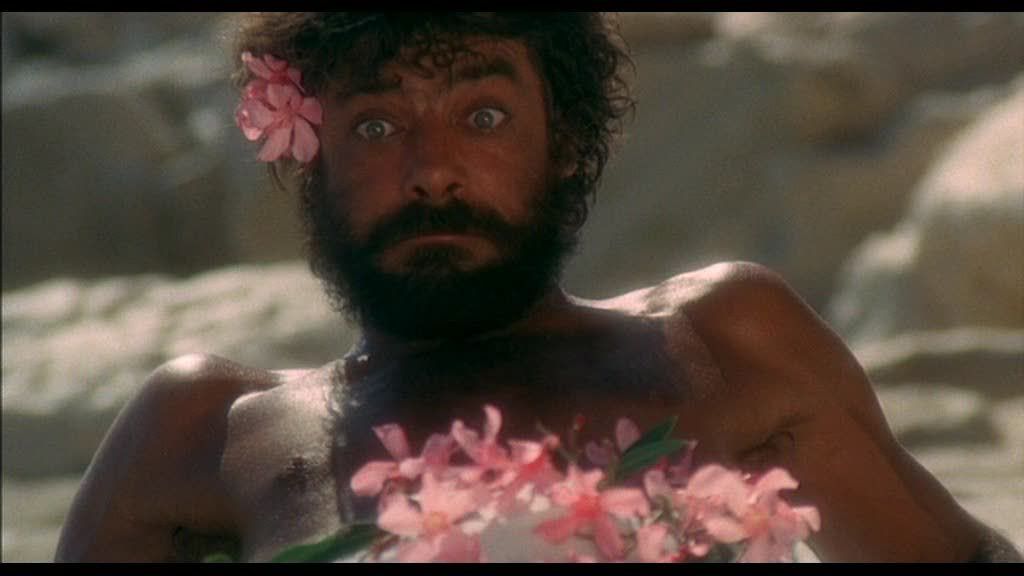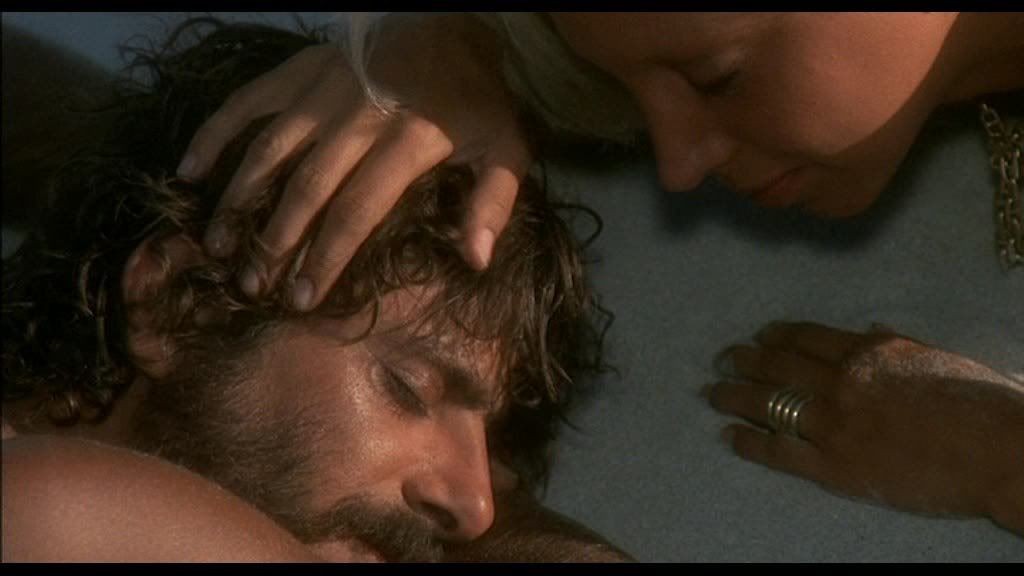
Giancarlo Giannini is FAB as the titular Pasqualino.
We would not advise
Pasqualino Settebellezze for the weak of stomach. If you're in the mood for a satirical, tragicomic Italian story which takes place during the Holocaust, you would do better to watch Roberto Benigni's relatively inoffensive
La vita è bella (Life is Beautiful). That is like Pasqualino lite. If, instead, you want to be provoked and shocked, then look no further.
That's not to say that Pasqualino Settebellezze is just a dressed up snuff film. Far from it. Hidden amid all that hideous wretchedness is a sharp intelligence; indeed, this is a film that will leave you thinking for a long time, and it will challenge a lot of your conventional notions about the right to survive. The watching of it, though, can be pretty painful.

Pasqualino is basically ruled by women, though he doesn't know it.

Pasqua and his friend, Francesco (Piero di Iorio).
The
picaresque story follows Pasqualino Frafuso (Giancarlo Giannini), a young Neopolitan in wartorn Italy. Pasqualino has seven sisters, all of them notoriously ugly, and he is a small-time thug and dandy. His nickname is Settebellezze (seven beauties), a play on his sisters and his schmoozy womanizing. The movie does everything in its power to destroy your sympathy for Pasquale: he is misogynistic, violent, idiotic and probably insane. When he catches his older sister working as a prostitute, he confronts her pimp and, accidentally, shoots him. His small-time mafia boss tells him that, to augment his reputation as a tough guy, he should do something really crazy with the body. Pasquale decides to cut it up and mail the pieces to various cities in Italy. He then spends the following years in an insane asylum, and escapes only by means of joining the Italian army. On his way to the Russian front, he deserts and wanders the German countryside. Eventually, he is caught and thrown into a concentration camp where, as a means to survive, he attempts to seduce the Nazi commander, a truly terrifying woman billed only as Commandant (Shirley Stoler).

AAAARGHHHH.
The twists and turns of this story all contribute to establishing the main theme: Pasqualino will do anything to survive. And the movie continuously questions whether it is, actually, always better to survive. Just before entering the insane asylum, Pasqualino's lawyer tells him, "It's either dignity or life!" Pasqualino hesitates, but chooses an undignified life. And then he is confronted with yet more choices - culminating in the final scenes in the concentration camp - where his survival relies on a continual abandoning of everything he holds dear. Just in case we might still sympathize with Pasqualino - these are impossible moral situations, after all, that he's facing - the director Lina Wertmuller throws in some scenes where Pasqualino is shown to just be an awful person. This alienation sort of works; Giancarlo Giannini's acting is genuine enough that we still felt bad for him, even though he was scummy.
What's furthermore odd about the film is how funny it is, often in the most unexpected places. Pasqualino's pitiful attempts at flirting with the Nazi commander got several laughs, even as we cringed for him at the same time. Indeed, the vibe of the film is just that: black comedy, purified. You laugh, and, even as you laugh, you feel uncomfortable. This is not necessarily a bad thing; at the end of it, we must say that we really enjoyed it.

A rare, pretty shot of Naples.
Now, some people have argued that this film is inherently misogynistic. As far as we can tell, the evidence is this: Pasqualino is a horrible misogynist, and almost every single woman in the film is portrayed as corrupt, horrible, and otherwise unsavory. We at the PPCC, always keen to dissect movies with a gendered scalpel, would argue that the film was far from misogynistic. First of all, Lina Wertmuller, the director, is clearly making a satire here about the Neopolitan man and his fragile macho-centric ego. Just note how dependent Pasqualino is on women - as a means of attaining honor (defending his prostitute sister), as a means of establishing his identity (his womanizing reputation in Naples), and, ultimately, as the key to his survival (the seduction of the scary Nazi woman). All along, Pasqualino's exploitation of women is undermined; e.g. the alienating scene in the insane asylum where he molests a patient. That is, as he exploits them, he condemns himself. Many scenes also show Pasqualino literally being jostled by a crowd of women. Even the sex scene with the scary Nazi woman - which, be warned, is like OMG MY EYES THEY'RE BURNING - minimizes and weakens Pasqualino. Rather than the virile man exercising his powers, he is rendered pitifully servile. The camera work diminishes him further; she is huge and looming, he cowers before her. Ugh, it really is awful.
Anyway, in light of Pasqualino's dependence, the woman are empowered. Sure, they are horrible - the Nazi woman in particular - but they are definitely in control. And surely feminism and female empowerment doesn't always assume that, once empowered, a woman is never villainous. Indeed it was refreshing to see a woman in the role of fearsome villain, and never is she portrayed in the standard witch/crone way, cackling and ultimately fragile in a crusty, wartish way. Instead she is a strong, commanding, brute presence.

Excellent composition.
In terms of filmmaking, Wertmuller seems particular keen on extre-eme close-ups. Our copy of the film was also worn out, so it was all rather ugly. But was the ugliness intentional? The story was pretty ugly, after all. We didn't particularly care for the cinematography, except in a few scenes (
Pasqualino's confrontation with the pimp, his run from the police,
the trial), so we can't give the film very high marks for aesthetics. That said, there were some interesting visual themes - the use of mirrors, especially. In the initial Naples setting, Pasqualino is shown to be obsessively narcissistic, constantly checking himself in the mirror. He weilds his power in the mirror, too, in the scene where he shouts down his prostitute sister. When he returns after the war to find a Naples invigorated and corrupted by the victorious American forces, the camera does everything in its power to delay showing us Pasqualino's face. There's a wonderful moment when, as his mother and fiancee (both now prostitutes) are encouraging him to forget the past and rejoice in being alive, we cannot see his face in the mirror. It is as if he has lost himself completely in his ordeal, and the man that survived has nothing left inside of him: honor, dignity, morality, identity. His mother encourages him, "Pasqua', you look great. It's finished now. Don't think about those horrible things anymore. Pasqua', you're alive. Alive!" Slowly, the camera pans around to reveal his face (in extreme close-up). We see that his hair is a bit grey, he looks tired. And he says, "Si. Son' viv'." Yes. I'm alive.

Note how we can't see Pasqualino's face in the mirror.
Watch a rare English-dubbed version of the entire film on Google Video.













